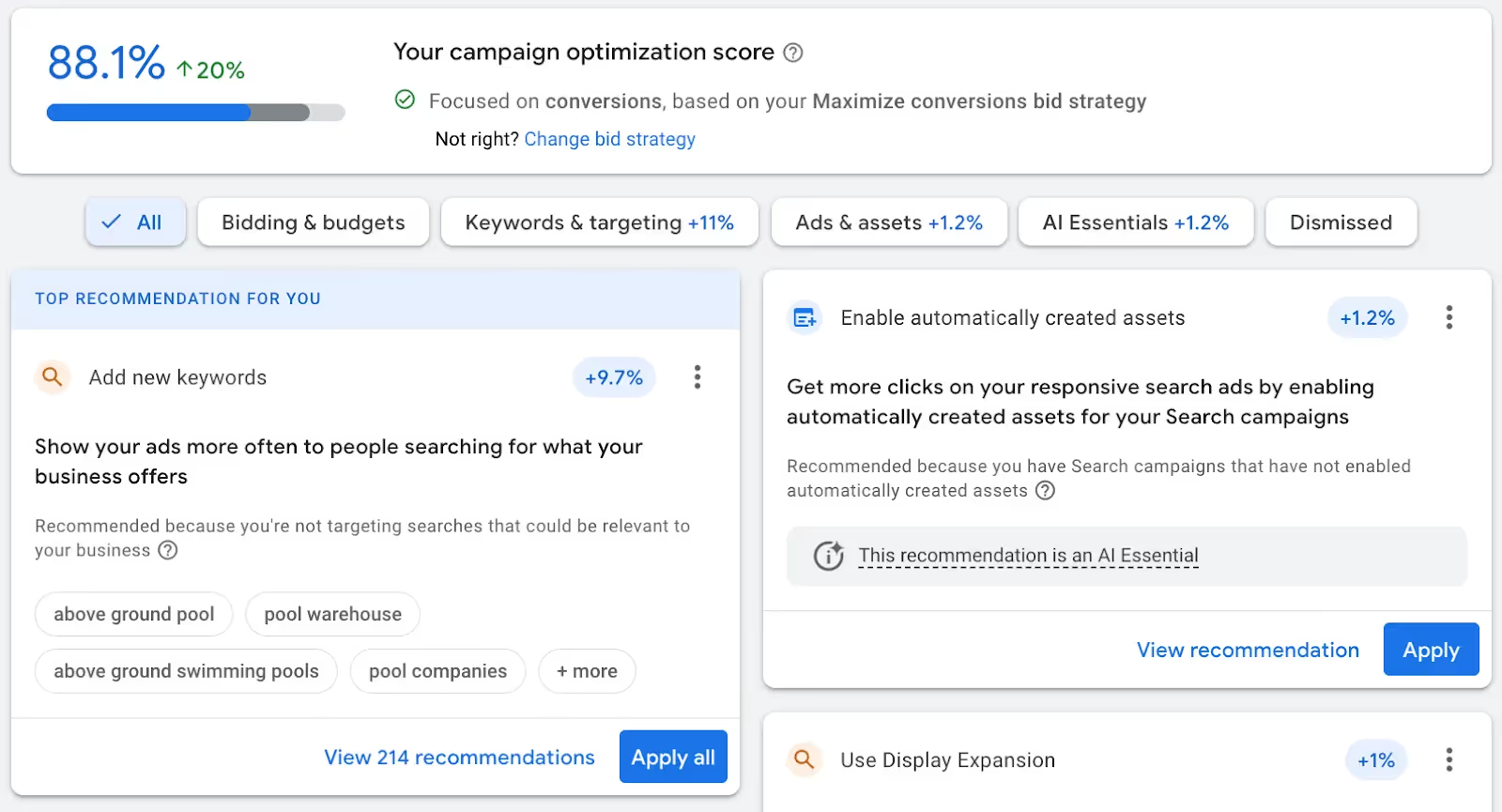This blog dives into the SEO vs Google Ads ROI debate, offering local business owners, digital marketers, and marketing managers a detailed comparison of costs, speed, and sustainability.

Will Google Ads Require an Agency to Manage them In the New AI Era?
Intro
In a digital landscape where Google Ads reigns supreme, the integration of AI marks a pivotal moment for advertisers worldwide. With a personal track record managing over 1 million in Google Ad spend, I find myself contemplating the inevitable question: Will the dawn of AI render traditional agency management obsolete?
As Google Ads evolves, embracing new AI features the future of digital agencies becomes unclear. Let’s dive into how this digital shift is changing the landscape and discover what the future holds for agencies in managing the constantly evolving world of Google Ads.
The AI Boom: A Double-Edged Sword for Businesses
Peter Thiel co-founder and former CEO of PayPayl gave the analogy “AI in 2024 is like the internet in 1999. It is clearly going to be important, big, transformative… but on a business level, it is very treacherous. There were a lot of different internet businesses that failed. Even the ones that succeeded it was quite a rollercoaster.”Businesses are rushing to jump on the AI train. But getting it right won’t happen overnight. In fact Google has been utilizing machine learning and AI in their campaigns for years. While some of the features worked well, not all tools worked perfectly. For example, Google Ads launched Smart Campaigns in 2018 (Now discontinued).
The Lessons from Smart Campaigns
Smart Campaigns are designed for small and local businesses that are not using an agency and may not even have websites.
Enter Performance Max: The Future of AI in Google Ads
The next phase in Google’s AI endeavor “Performance Max Campaigns” launched in 2021. Performance Max, can automatically adjust bids, target the right audience, and manage budgets more effectively than manual efforts. This automation could make it seem like businesses can manage their ads without needing an agency. Here’s the catch. The Performance Max needs a captain and good data sources for successful results. Our agency is a Google Partner & our clients spend 10s of thousands in ad dollars every month. This has allowed me to meet with Google representatives who guide agencies like ours to the best practices with the latest Google Ads offerings. The main message they share about Performance Max campaigns is this: The results will not be good unless you feed it good data, and run an efficient Search campaign alongside it.
Why Agencies Still Matter in the Age of AI
Agencies still offer a lot of value. While AI helps ad targeting, it doesn’t replace the strategic thinking and creativity that agencies provide. Understanding how these campaigns and tools work is the new role of ad experts at agencies.
The Human Touch: What AI Can’t Do
In this new AI-driven world, combining technology with human expertise is often the best approach. AI can handle many routine tasks, but agencies bring the strategic and creative skills needed for successful ad campaigns. Agency expertise will be key for businesses looking to get the most out of their Google Ads.
Outside of performance efficiency, businesses will face other challenges managing Google Ads without an agency or dedicated Google Ads expert. Those challenges include:
- Ad Disapproval
- Ad Extension Disapproval
- Business & Advanced Verifications
- Billing issues & monitoring

Regarding performance efficiency, there are many variables that Google Ads will recommend that may or may not actually improve performance. The biggest catalyst is Google Ads’ Optimization Score.
Google Ads Help states: Optimization score is an estimate of how well your Google Ads account is set to perform. Scores run from 0-100%, with 100% meaning that your account can perform at its full potential.
Along with the score, you’ll see a list of recommendations that can help you optimize each campaign. Each recommendation shows how much your optimization score will be impacted (in percentages) when you apply that recommendation.
Google’s UX makes it easy to apply most of these recommendations with 1 click. The challenge that is the recommendations do not guarantee better results. Each business has different nuisances and goals. Here is a list of recommendations with the promise to increase the optimization score.
- Increase Budget - Google wants more of your money. Without an expert reading the data, this could be inefficient.
- Launch a Performance Max campaign - Google wants more of your money. Without enough data and proper setup, this could be inefficient.
- Add more keywords - Google attempts to recommend searches similar to your existing keywords. Google doesn’t understand your business. For example, the screenshot below is a campaign for a pool builder. Google is recommending above-ground pools which is a service the business doesn’t offer.
- Enable Automatically Created Assets - Google wants permission to create ads. This can create a confusing message. For example, Google may write copy that says “Same Day Service” but the business doesn’t offer it.

One of the biggest misconceptions is that AI can fully replace the nuanced expertise of seasoned marketers. While AI in Google Ads has come a long way, it lacks the human touch that agencies bring to the table—interpretation, intuition, and the understanding of market dynamics. Data alone doesn't always tell the full story. As algorithms improve, they can predict and react based on patterns, but they can't anticipate or respond to shifts in human behavior like an experienced marketing team can.
Let’s not forget that successful advertising isn’t just about putting the right ad in front of the right person. It’s about creating compelling narratives, understanding customer pain points, and tailoring messages to resonate. Even the most advanced AI is yet to match the emotional intelligence that agencies provide.
Another factor is the role of relationships. Many businesses value the partnership they have with their agency—not just as ad managers but as strategic advisors. Agencies often serve as a bridge between a company’s marketing goals and its broader business objectives, helping navigate market shifts, seasonal trends, and economic changes. This role is not easily automated.
A Balanced Future: AI and Agencies Working Together
What we’re seeing with AI, especially in Google Ads, is that it can complement, but not replace, human-led strategies. It’s a tool that, when wielded by professionals who understand both its capabilities and limitations, can deliver better results. In other words, the future of AI in advertising isn't about "either-or" when it comes to choosing between technology and human expertise. It’s about how well we can work together.
As AI technology becomes more advanced, the relationship between agencies and clients is likely to evolve. Agencies may spend less time on manual tasks like bid adjustments and more on providing higher-level strategic insights. This shift could lead to more streamlined processes, but it will also require agencies to adapt and specialize further. Those who can harness the power of AI while still offering human-driven strategies will thrive in this new era of advertising.
Ultimately, the future of Google Ads management won’t be about the death of agencies. Instead, it will be about agencies evolving to take on more strategic roles, providing value where AI falls short, and using technology to amplify their impact.
Conclusion
Having tested Smart Campaigns in the past the major issue was needing more optimization. For example, most of the businesses I work with only want more form submissions and phone calls. During set up you configure it to maximize those leads. However, because of the optimization restriction, there is no way to improve the quality of those leads. For example: A Toyota dealership is running a smart campaign. A user searches “Toyota Tacoma MPG”. The smart campaign ad triggers and answers the user’s question but it wasn’t a lead-generating search query. Versus a traditional search campaign, you can limit campaign targeting to focus only on lead-generating searches. Smart campaigns could generate leads but along with it, spending inefficiency.
Related Articles


